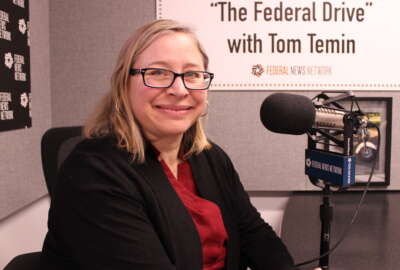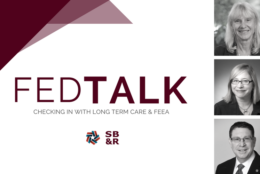Time to shake off the doldrums, get it in gear, and help out fellow feds
You've still got a couple of days left to sign up for the Feds In Motion 2022 challenge. It's a fundraiser by the Federal Employees Education and Assistance Fund.
Best listening experience is on Chrome, Firefox or Safari. Subscribe to Federal Drive’s daily audio interviews on Apple Podcasts or PodcastOne.
You’ve still got a couple of days left to sign up for the Feds In Motion 2022 challenge. It’s a fundraiser by the Federal Employees Education and Assistance Fund. It only costs $39. For more, and an update on FEEA’s good works, acting executive director Robyn Kehoe joined the Federal Drive with Tom Temin.
Interview transcript:
Tom Temin: Robyn, good to have you on.
Robyn Kehoe: Good morning, Tom, thanks so much for having me.
Tom Temin: And tell us about the Feds in Motion Challenge. What do people have to do and what’s involved here?
Robyn Kehoe: So the cool thing about Feds in Motion is that it is a virtual event, which means people are joining us from all over the country. And we’ve even got some folks signed up from Puerto Rico and Germany. And so it’s really fun, anybody can participate. And our challenge is for people to walk, run, bike, swim or roll 36 miles over a 36 day period. And we chose 36, because this year is FEEA’s 36th anniversary.
Tom Temin: Wonderful. So the $39 then goes to your various causes.
Robyn Kehoe: Yes, it supports the programs that FEEA has for federal employees and their families. Emergency help when folks are having a tough time due to illness or injury, that sort of thing. We do disaster relief for feds, we have a scholarship program and tutoring for kids of feds.
Tom Temin: And getting back to the challenge itself. This is pretty much an honor system that people report. Is there a website? How do you know that they’ve done it?
Robyn Kehoe: The site that we use is Run Sign Up, they host our challenge for us. And there is an easy way once you’ve registered to log your miles each day when you participate. And you’ll go in and put in what type of activity you did and how many miles. And so yes, it is an honor system, we find that folks are generally pretty honest about that.
Tom Temin: Well, gee, I do a lot of five and six mile walks, I don’t run quite as much as I used to, but I could probably get it done in a week.
Robyn Kehoe: It’s great. You can blast on past the 36 miles, we try to make it an attainable goal for anybody, even if they’re not used to doing a lot of exercise. But we definitely had some folks last year who were logging hundreds of miles, you know, serious bike riders, cyclists, that kind of thing.
Tom Temin: And do you get some of the higher ups in the federal agencies are it pretty much have fully a workers bee type of event?
Robyn Kehoe: You know, it kind of has been a mixed bag, we get people from all levels. Last year, I think we actually had a couple of federal judges who participated. So it’s a really fun event for anybody at any level of an agency and also to invite friends and family to join in as well.
Tom Temin: We should at least get the Secretary of the Interior out there. I mean, they’ve got the Park Service. So that would be a good one to get in there.
Robyn Kehoe: That would be great.
Tom Temin: And how many people do you expect to participate? And what kind of fundraising will you yield there?
Robyn Kehoe: So we have just had our 1,300th person sign up just this morning. And last year, we had a little over 1,300 people and we raised about $95,000 for our programs. So it’s a really important event for us to be able to do what we do all year long.
Tom Temin: Yeah, that’s a real chunk of change there. And you’ve got a lot of good sponsors too, don’t you?
Robyn Kehoe: We have terrific sponsors. The list is long, but our platinum sponsor is the Blue Cross Blue Shield Association, Federal Employee Program, which has been a longtime supporter of FEEA. And then we have some great silver sponsors in GEHA, the Senior Executive Association and WAEPA. So those are kind of our top sponsors.
Tom Temin: And Federal News Network is one of your media sponsors, and we’re proud to do that.
Robyn Kehoe: Federal News Network is an important media sponsor.
Tom Temin: All right, we’re speaking with Robyn Kehoe, acting executive director of the Federal Employees Education and Assistance Fund. And recently you put up a new annual report, kind of summarizing all of the things that FEEA has done. Give us a quick rundown there.
Robyn Kehoe: So last year was a really exciting year for us because it was our 35th anniversary. And then I think anybody knows that those zeros and the fives are kind of important milestones where we look back over everything that we’ve done. And what we’ve realized is that, you know, FEEA has served over 60,000 federal employees and their families in those 35 years and last year, and in the last couple of years, as we all have, we pivoted to help folks during the pandemic. And so one of the great things that we did was introduce a tutoring partnership that has allowed us to provide free tutoring for kids in grades K through 12, who have a federal employee parent. So that was a new pandemic program that we’re going to be continuing we’re really excited about that.
Tom Temin: What has the uptake been how many people have been tutored?
Robyn Kehoe: So in the beginning, during the height of the pandemic, we had over 5,000 people sign up, and this last year with kids back in school, people feeling a little bit less need, we had 500 people who actively use the program. So we think it’s a good thing for kids who might need that extra bit of help from time to time.
Tom Temin: And on the educational elements beyond the tutoring, you also have a scholarship program, too, correct?
Robyn Kehoe: We do have a scholarship program that’s an annual program. It’s a merit based contest that we run every year. And we award a little over 200 scholarships a year to deserving students who can be federal employees themselves or the spouses or children of federal employees.
Tom Temin: And the assistance part of FEEA. This is something I think a lot of people don’t necessarily understand. But federal employees themselves are often affected by the disasters and occurrences for which they are helping the rest of the public, but they can be also affected loss of homes or inability to be in their homes for some temporary period. Tell us more about that end of things.
Robyn Kehoe: Sure. So our Disaster Relief Program provides help to feds in exactly those circumstances when there is a natural disaster that affects federal employees, damages their homes, causes them to have to evacuate, that sort of thing. We provide a bit of temporary relief in the form of a small grant to help folks while they’re waiting for their insurance to come through, for FEMA to process an application, those sorts of things. But really the bread and butter part of our assistance program is our emergency hardship loans. And those are the when bad things happen to good people loans. That’s how we like to think of them that federal employees often have situations where they or a family member have a serious illness. And they end up with leave without pay because they’re recovering or taking care of someone else. We see people all the time, who now have had issues with domestic violence or with having their identity stolen, that causes a financial hardship. And so what we do is provide a short term loan by paying one of their creditors, so we’ll pay their rent or mortgage for a month, we’ll pay their utilities for a month. And then the employee pays us back through payroll allotment, no fees, no interest added. It’s really to just be a safety net and try to help people not have deeper financial woes from a short term problem.
Tom Temin: And did the pandemic make this worse, were there greater numbers of people that had say leave or medical situations in the past couple of years?
Robyn Kehoe: So because of the additional special leave categories that there were during the pandemic for people with COVID-related illnesses, we actually saw a little bit less of that for a time. But we’re definitely now with people getting back to work, getting back into offices, some of the things that they were maybe able to handle while they were working at home are definitely starting to cause problems again, and definitely the economy is a factor for feds as well.
Tom Temin: Sure. And we should not let you go without mentioning the annual Federal News Network Motorcycle Ride for Charity of which FEEA is one of the beneficiaries. And also you’re our kind of administrative agent for collecting funds. That’s coming up May 20. I don’t think we’ll get 1,300 motorcycles like you’re getting 1,300 people to participate in the distance challenge. But we should have a pretty good year this year.
Robyn Kehoe: It’s a fun event. And I know that I’ve put in my order for good weather on that Friday, Tom, I hope you have as well.
Tom Temin: I sure have. Yes, pretty much weather drives everything on two, four wheels, on foot, I guess for that matter, also. Robyn Kehoe is acting executive director of the Federal Employees Education and Assistance Fund. Thanks so much for joining me.
Robyn Kehoe: Thanks, Tom.
Copyright © 2025 Federal News Network. All rights reserved. This website is not intended for users located within the European Economic Area.
Tom Temin is host of the Federal Drive and has been providing insight on federal technology and management issues for more than 30 years.
Follow @tteminWFED





